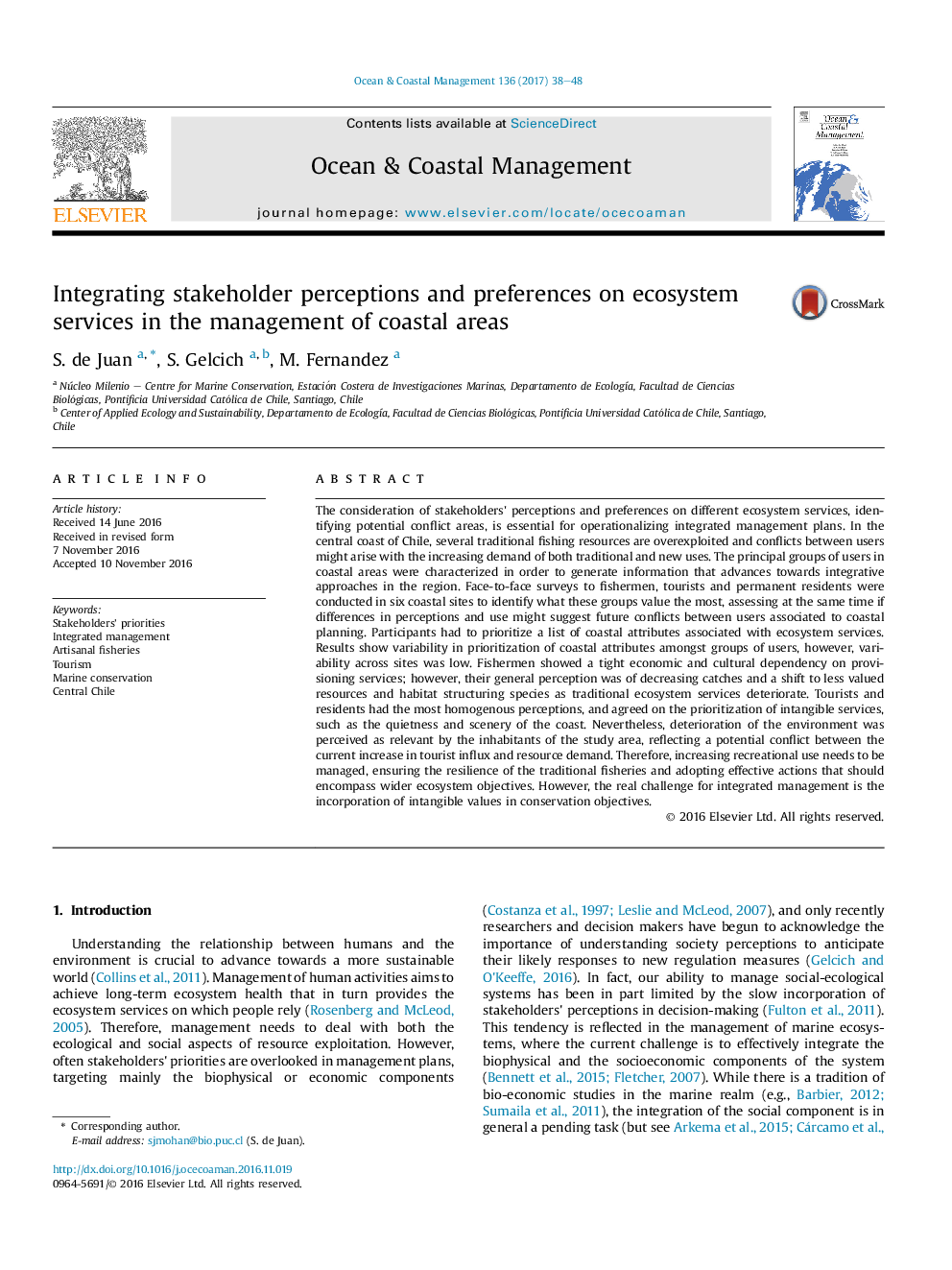ترجمه فارسی عنوان مقاله
ادغام ادراکات و ترجیحات ذینفعان در مورد خدمات اکوسیستم در مدیریت مناطق ساحلی
عنوان انگلیسی
Integrating stakeholder perceptions and preferences on ecosystem services in the management of coastal areas
| کد مقاله | سال انتشار | تعداد صفحات مقاله انگلیسی |
|---|---|---|
| 160153 | 2017 | 11 صفحه PDF |
منبع

Publisher : Elsevier - Science Direct (الزویر - ساینس دایرکت)
Journal : Ocean & Coastal Management, Volume 136, February 2017, Pages 38-48
ترجمه کلمات کلیدی
اولویت های ذینفع، مدیریت مجتمع، شکارچی ماهیگیری، گردشگری، حفاظت دریایی، شیلی مرکزی،
کلمات کلیدی انگلیسی
Stakeholders' priorities; Integrated management; Artisanal fisheries; Tourism; Marine conservation; Central Chile;
ترجمه چکیده
ارزیابی درک و ترجیحات ذینفعان در مورد خدمات مختلف اکوسیستم، شناسایی مناطق بالقوه مناقشات، برای عملی کردن برنامه های مدیریت یکپارچه ضروری است. در ساحل مرکزی شیلی، چندین منبع ماهیانه سنتی بیش از حد مورد استفاده قرار می گیرند و اختلاف بین کاربران ممکن است با افزایش تقاضای مصرف هر دو سنتی و جدید مواجه شود. گروه های اصلی کاربران در مناطق ساحلی به منظور تولید اطلاعاتی که پیشرفت هایی نسبت به رویکردهای یکپارچه سازی در منطقه دارند، مشخص شد. بررسی های چهره به چهره ماهیگیران، گردشگران و ساکنان دائمی در شش سایت ساحلی انجام شد تا بتوانند بیشترین ارزش این گروه ها را در نظر بگیرند، در حالی که اگر تفاوت های در ادراک و استفاده ممکن است درگیری های آینده بین کاربران مربوط به برنامه ریزی ساحلی را ارزیابی کند. شرکت کنندگان باید فهرستی از ویژگی های ساحلی مربوط به خدمات اکوسیستم را اولویت بندی کنند. نتایج نشان می دهد متغیر بودن در اولویت بندی ویژگی های ساحلی در میان گروه های کاربر، با این حال، تنوع در سایت ها کم بود. ماهیگیران وابستگی اقتصادی و فرهنگی خود را به خدمات ارائه خدمات نشان دادند با این حال، ادراک عمومی آنها کاهش جلب و تغییر به منابع کمتر ارزشمند و گونه های ساختاری زیستگاه را به عنوان خدمات اکوسیستم سنتی رو به وخامت است. توریست ها و ساکنان دارای درک های همگرا بودند و در مورد اولویت بندی خدمات غیرمستقیم، مانند آرامش و مناظر ساحل موافقت کردند. با این وجود، زوال محیط به عنوان ساکنین منطقه مطالعه در نظر گرفته شد، و منعکس کننده مناقشه بالقوه بین افزایش جاری در جریان گردشگری و تقاضای منابع است. بنابراین، افزایش استفاده از تفریحی باید مدیریت شود، تضمین انعطاف پذیری شکار سنتی و اتخاذ اقدامات موثر که باید اهداف گسترده اکوسیستم را شامل شود. با این حال، چالش واقعی برای مدیریت یکپارچه، ترکیب ارزش های نامشهود در اهداف حفاظت است.

